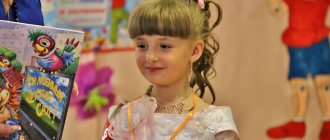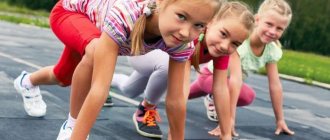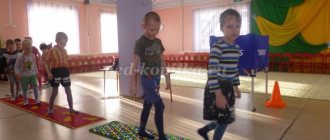NEW STRUCTURE – THIS IS MY MOTHER
- Place the “My family” cards on the table. Explain to the children that you will be talking about your family and will be showing the person you are talking about.
- Point to the first picture and say: This is my mother. Rearrange. Ask the children to repeat the sentence in chorus.
- Then say: My mother's name is Lena. Ask the children to guess the meaning of what was said and translate the sentences. Repeat the sentence in unison.
- Similarly, work out the sentences based on the pictures that remain.
game walker - my family. We roll the dice and walk. Let's call the little man. The teacher asks - who is this? -This is—
Lesson summary “My Family”
Summary of the lesson of the deputy director for educational work of the MBOUDOD Center for Children's Creativity in Aznakaevo
Aminova Ruzalia Mirzayanovna
FULL NAME. teacher
: Aminova Ruzalia Mirzayanovna
parole
: municipal budgetary educational institution for additional education of children Center for Children's Creativity in Aznakaevo, Aznakaevo municipal district of the Republic of Tatarstan
Program
: English for preschoolers “I can sing”
Lesson topic
: Here is my family (Family members)
Type of activity
: Classes on maintaining a new topic
Goals and objectives of the lesson:
Lesson objectives:
- introduction of vocabulary on the topic “My family”
- development of the skill of monologue statement on the topic “About myself”
Tasks:
Educational
:
— formation and consolidation of students’ primary knowledge on the topic “My family”
Educational:
— development of students’ imagination based on knowledge of the vocabulary of a new topic in their native language;
- develop attention, perseverance, memory.
Educational:
— developing interest in a foreign language.
Lesson form
: group
Methods
: verbal (story, explanation), visual (showing students illustrative aids: paintings), practical (exercises to consolidate vocabulary), reproductive (repeat after the teacher), control and correction (clarification of answers, correction of answers), game.
Didactic tools:
toys, pictures by topic
TSO
: record player
References
: V.N. Meshcheryakova. I can sing in English. Kazan. 2003.; English lessons by I.A. Murzinova. (https://www.englishhobby.ru).
- Organizational stage.
1.Goal for students:
Our guest forgot your names, got everything mixed up. Let's help him by answering “Yes, I am” (if he guesses your name) and “No, I am not” (if he doesn’t guess)
2. Goal for the teacher
: updating students’ basic knowledge on the topic “About yourself. My name is…..”, mobilizing their attention, introducing them to the sounds “a”, “ai”, “r”.
3. Criteria
: active involvement of students in the lesson process, participation in answering questions from all students, a sufficient number of correct answers.
Teacher:
Hello kids! I am so glad to see you! Let's begin our lesson! Let's sing a song! (Let's start our lesson and sing a song)
Good morning! Good morning! Good morning to you!
Good morning! Good morning! I am fine! How are you?
Oh, but where is Spot? (Where is Spot? We can’t start without him. (Spot is a toy that is one of the leaders of the lesson and is present in almost all lessons.) I remembered Spot told me this morning that to invite him, we need to count to five: So.
Children
: One, two, three, four, five (at this time the teacher takes out a toy)
Spot
: Hello kids!
D
: Hello Spot!
Spot
: Glad to see you!
U:
Spot, have you forgotten the guys' names? Let's check it now.
(Spot approaches the children and first says their names incorrectly, then...remembers):
Spot
: Are you Sveta?
(Spot approaches each student and asks the same question, and the students answer - Yes, I am or No, I am not. Thus, through repeated repetition of these two structures, children remember what this question means and how to respond to it) .
U:
Well done! Everyone answered Spot's questions correctly, you all know your names. Let's clap our hands. Clap your hands!
(Children clap their hands)
U:
Guys, funny people Englishsounds are here again. Quiet! Do you hear the sound? This little man breathes on the window glass (x....x.....x.....x) and draws letters with his finger. That’s what they called him (x), his name is just a light exhalation. Can you imagine how difficult it is with a name like that? Everyone is called to eat cake, but this little man doesn’t hear. Let's all call him together, maybe then he will hear us. The next Englishsound is afraid of everything. A door creaks or a dog barks, a little man screams (Ouch). Say after me ai…ai…ai…ai. And this Englishsound loves to scare everyone. He growls like a bear in the forest (g...g...g...g...g).
- Learning new material.
1. Purpose for students
: Today we will have another guest. He has been asking us for a long time and he says that he wants to introduce us to his... . With whom, you will find out later and I think you can tell me later.
2.Goal for the teacher
: introducing students to new words on the topic “Family”, developing students’ interest and creative imagination.
3 .
Lesson
stage 2 plan : 1. Look at the toys! What is this? (Toys). 2. The appearance of a guest. 3. Introduction of the guest's family members. 4 . Game “What is there in the bag?” 5. Learning the song “Do you have a father?…..”
4. Forms and methods of presentation
: working with toys, singing songs with grammatical structures, voicing dialogue with a guest, playing with new vocabulary.
5. Forms and methods of organizing student activities:
students, remembering previously studied words, first guess which guest will come, then get to know him, answering him and asking questions themselves, and in the end, relying on pictures without translation, they guess, learn about new words on the topic “My family” and through games and songs, i.e. through repeated repetition, they remember them in order to reproduce them without problems in the next lessons (mentally remembering how they were presented to them, the students)
6. Criteria for determining the level of attention and interest
: the lesson goes briskly, quickly, there are a lot of successive actions, the teacher is a real artist, he has to be both the teacher, the hero of the lesson and the guest at the same time, at the same time use all the methods, ways to speak English without translation and the most the main thing is that the students understand it.
- Look at the toys! What is this? Let's remember our toys. Another guest will come to us, maybe it’s someone we already know.
(The teacher shows the toys and asks everyone the same question What is this?, thus, this grammatical structure is consolidated through listening. The song “This is a bear”
- (there's a knock on the door) Look! Someone is knocking at the door! Who is it? ... It is me. Who are you? …. That is a secret! Guess! (a guest came, doesn’t say his name, asks the children to guess)
U: Are you a bear? Are you a dog?... (they ask questions using all the toys they know) Are you a boy? – Yes, I am. (to these words, the guest comes in, asks the guys How are you? And says that he brought his family album with him and wants to introduce the guys to his family members. The guest shows pictures and says: This is my father. This is my mother. This is my sister. This is my brother.
U: Let's repeat after him! - This is my father. This is my mother. This is my sister. This is my brother.
T: The teacher takes out a box and asks you to guess whose photograph is there.
- Learning the song “Do you have a father?”
Physical education minute
: Did you remember to do your exercises today? Now I’ll check: Stand up! Sit down! Hands up! Hands down! Hands on knees! Clap your hands! Stamp your feet! 1-2-3-Hop! 1-2-3- Stop!
- Consolidating new material
.
- Goal for students
: I think you have memorized new words. Now I propose to play a game with you and see who has the best memory.
- Goal for the teacher
: consolidation of new vocabulary, control and assessment of their level of attention, memory, identification of students’ attitude to the lesson.
- Forms and methods of fixing material
: game “Who is missing” (Who is missing? The teacher lays out photographs of the guest’s family members, the children look carefully, turn away, the teacher removes one of the photographs, the students determine which family member’s photo is missing and speak English), assessing the lesson with cards (red - very good, blue – bad).
- Mastery criteria:
the maximum number of students who name new words during the game in English, the ability to correctly evaluate their participation in the lesson and analyze the lesson (even if using a simple method: show cards)
4. Homework assignment
: You did great today! Today we managed to do a lot, sang songs and learned new words. Go to your parents and tell them what we did today.
The nuances of using English names of family members in sentences
In addition to the fact that for a high-quality and understandable conversation about the family you need to know all the terms related to relatives and other family members, you will have to master some rules for using these words in practice: in sentences of oral and written speech. We'll look at three main features.
- Nouns that denote family members, relatives (for example, mother - mother, father - dad, sister - sister, brother - brother, uncle - uncle, aunt - aunt, grandmother - grandmother and the like) belong to the group of words that is used with an indefinite article to indicate family relationships.
Example:
I have got a sister— I have a sister.
Not has got an aunt - He has an aunt.
If words such as mother and father refer to the speaker’s relatives, then they should be used without an article, but with a capital letter.
Example:
Mother is not in yet - Mom has not come yet.
Father is not up yet - Father has not yet risen.
All other words of the group, for example aunt - aunt, uncle - uncle, sister - sister, cousin - cousin, brother - brother are written so that the word is followed by a proper name or preceded by a possessive pronoun.
Example:
Aunt Ann - Aunt Anna.
Uncle Sam - Uncle Sam.
- If in a sentence we are talking about someone’s relatives, then we should use a possessive pronoun, even if we are talking about proper names.
Example:
Is your uncle Sam coming? — Is your Uncle Sam coming?
- Proper names that are in the plural and designate members of the same family must be used with an article. First of all, we are talking about surnames.
Example:
the Petrovs - Petrovs.
the Forsytes - The Forsytes.
Gender category and words
The English language is structured in such a way that there is no grammatical category of gender for nouns, and here they belong to one gender or another based on semantics. You may notice that many nouns that denote kinship also indicate a person's gender. For example, father - dad, brother - brother, son - son, nephew - nephew, uncle - uncle, grandfather - grandfather, obviously masculine. Feminine words include words such as mother, sister, daughter, niece, niece, aunt, grandmother.
An external indicator of the gender of a noun in a language is the use of personal or possessive pronouns when replacing a noun. For example: he/he (his) - for the masculine gender; she/she (her) - for the feminine gender; it/he, she, it (its) - for the neuter gender.
An adjective, pronoun and article in English will not change their form when used with nouns denoting persons of different genders. Example:
My little brother - My little brother.
My little sister - My little sister.
With the information obtained from the article, you can easily create a family tree in English. You will be able to better understand your English-speaking interlocutors, and also improve your level of language knowledge.
Story in English my family
My family or about my family
My name is Alexander. I am 13 years old and I live in a happy family, which consists of my mother, father and my younger brother Oleg, who is eight years old. My dad Vladimir is an electrician and works at a factory. He installs electric motors for factories. The job is not bad I think, but my dad always reminds me to study better so that I can get another job when I grow up. My mother Natalia works in a supermarket, this is a useful job because she gets discounts on products and brings home delicious candies and chocolate, sometimes new computer games that Oleg and I have never played before.
Oleg, my brother, is quite funny. He's very smart and really likes to draw, which is good, but lately he's been a bit of a problem, wanting to play my games on dad's laptop. This sometimes leads to quarrels, and my mother constantly tells me that I should share more with Oleg. I like to meet my friends in the park after school. We practice with our skateboards, doing tricks. However, every day I have to pick up my brother and take care of him, which means I have to also take him to the park with me. It's great, but he wants to do the same tricks as me and my friends, but he's too small and sometimes he knocks his knee out or hurts himself, and mom of course punishes me when that happens and she says I'm not should allow Oleg this. But I'm proud of what he does. No other eight year old in the area can match him, I'm sure!
I love visiting my grandparents in the village. They are interesting people and always tell me exciting stories. My favorite thing is when we take our tent and go to the forest nearby and set up camp. Dad makes barbecue from meat and fish, and mom brings food from grandma in saucepans. We play football and other games in the daytime. At night, dad plays the guitar and we sing songs around the fire. Mom, dad, me, and Oleg. I like my family; life is wonderful!
Flashcards and workbook
We recommend dividing words from the topic “Family” into two lessons. If you have the opportunity, print out cards and workbooks, you can work with them in any way, the more fun and dynamic, the better






